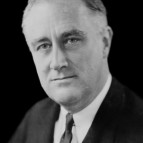
Franklin Delano Roosevelt (1882–1945), following in the footsteps of his famous fifth-cousin, President Theodore Roosevelt, entered politics as a young man. After serving in the New York State Senate and as Assistant Secretary of the Navy under President Woodrow Wilson, Roosevelt fell ill with polio in 1921. In 1932, at the height of the Great Depression, Roosevelt became President of the United States. His administration implemented the New Deal, a host of social programs including Social Security and the Public Works Administration designed to combat unemployment and poverty. Roosevelt also faced a growing international crisis in the 1930s as war broke out in Europe and Asia. Though he gave monetary support to Allied Forces, England, and China, Roosevelt officially maintained American neutrality until the Japanese attack on Pearl Harbor on December 7, 1941, at which point he declared war on Japan and Nazi Germany and brought America into the Second World War.
Franklin Delano Roosevelt
Franklin Delano Roosevelt (1882–1945), 32nd President of the United States (1933–45), delivered this famous speech to a joint session of Congress, calling for an official declaration of war.
Franklin Delano Roosevelt
In an address delivered before the Tomb of the Unknown Soldier at Arlington National Cemetery less than a month before the Japanese attack on Pearl Harbor (December 7, 1941) would bring the United States into war, President Franklin D. Roosevelt (1882–1945) spoke about the meaning of Armistice Day and the war whose conclusion it commemorated.
Franklin Delano Roosevelt
In the dark days of World War II, with the outcome very much in doubt, Independence Day was observed not by fireworks—as nighttime blackouts were observed in all cities and towns—but by extra dedication to the war effort. In this radio address to the nation on July 4, 1942, President Franklin Delano Roosevelt (1882–1945) set the tone.
Franklin Delano Roosevelt
On the evening (in the United States) of June 6, 1944, after the Normandy invasion had already been launched, President Franklin Delano Roosevelt (1882–1945) spoke to the nation, praying for the soldiers fighting across the Atlantic and for those at home who supported their efforts.
Franklin Delano Roosevelt
Having just returned from a trip across nine states to see the effects of the then-ongoing Dust Bowl and drought, on September 6, 1936—two months before the next election, and with the country still in the midst of the Great Depression—President Franklin D. Roosevelt (1882–1945) spoke directly to the American people in one his famous evening radio addresses.
Franklin Delano Roosevelt
On May 3, 1944, with the United States already deeply engaged in World War II and preparing quietly for the next month’s Normandy invasion that would turn the tide of war in Europe, President Franklin D. Roosevelt (1882–1945) issued this proclamation for the observance of Flag Day on June 14, 1944.
Franklin Delano Roosevelt
A rather different George Washington, invoked for a different purpose, is the subject of this radio address to the nation by our 32nd president, Franklin Delano Roosevelt (1882–1945), delivered in the dark days of the Second World War.
Franklin Delano Roosevelt
Since Columbus Day became an annual national holiday in 1934, our presidents usually mark the day with some proclamation or public statement. President Franklin Roosevelt (1882–1945) issued many such statements during his four terms in office (1933–45). This one, from October 12, 1940, was made as World War II was raging in Europe, but before the United States would enter the war a year later.

